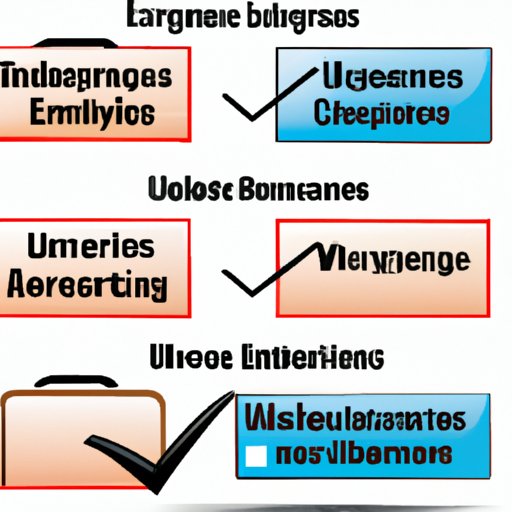
Introduction
Unemployment benefits are a valuable resource for employees who have lost their jobs through no fault of their own, providing them with financial assistance during a period of transition. However, what happens if you quit your job? The question of whether or not you are eligible for unemployment benefits after quitting can be complex, and it’s important to understand the rules and regulations governing the process.
Can You Receive Unemployment if You Quit Your Job? Exploring the Eligibility Requirements
In order to qualify for unemployment benefits, you must typically meet certain eligibility requirements, such as:
- Being separated from your job due to no fault of your own, such as a layoff or termination
- Meeting the minimum earnings requirements for your state
- Being available and actively seeking work
- Meeting any other state-specific requirements for eligibility
Quitting your job voluntarily may disqualify you from receiving unemployment benefits, as it is generally not considered a “good cause” for separation from employment. Typically, “good cause” is defined as a situation where the employer has created an intolerable or unsafe work environment, or where the employee has been forced to resign due to circumstances beyond their control.
The Gray Area of Unemployment Benefits for Quitters
There are some situations in which quitting your job might make you eligible for unemployment benefits. For example, if you can demonstrate that you quit due to intolerable or unsafe working conditions, you may be able to receive benefits. However, this can be a difficult case to make, and you may need to provide substantial evidence to support your claim.
Other situations in which quitting may be considered a valid reason for receiving unemployment benefits include:
- Being forced to quit due to a medical condition or disability, where your employer is unable to accommodate your needs
- Being forced to quit due to sexual harassment or discrimination
- Being forced to quit due to a change in job location that makes it impossible for you to continue working (such as a move to another state)
Ultimately, it will be up to your state’s unemployment agency to determine whether or not your reason for quitting qualifies you for benefits.
Breaking Down State Regulations: When You Can and Can’t Get Unemployment After Quitting
Each state has its own regulations for unemployment benefits, so it’s important to know the rules in your specific location. In general, the following situations are typically considered “good cause” for quitting and may qualify you for benefits:
- Being forced to quit due to harassment, discrimination, or unsafe working conditions
- Being forced to quit due to a spouse’s relocation
- Being forced to quit due to obligations related to the care of a child or elderly family member
- Being forced to quit due to a significant decrease in hours or pay
However, if you quit your job for personal reasons (such as wanting to change careers, or not liking your boss), you will likely not be eligible for benefits.
Is It Worth Quitting Your Job if You’re Not Eligible for Unemployment Benefits?
If you are not eligible for unemployment benefits after quitting your job, it’s important to consider the financial implications of your decision. In many cases, quitting a job without having another source of income lined up can be risky and may result in financial hardship. You may need to consider alternative sources of income or make significant cutbacks in your spending in order to make ends meet.
Some key financial strategies to help offset the loss of unemployment benefits include:
- Building up an emergency fund to cover expenses for a few months
- Looking for part-time or freelance work to supplement your income
- Reducing expenses and living frugally to stretch your budget further
Navigating Unemployment Eligibility When Resigning From Your Job
If you do decide to quit your job, it’s important to take steps to maximize your chances of being eligible for unemployment benefits. This includes:
- Providing your employer with sufficient notice before quitting
- Documenting any instances of harassment, discrimination, or unsafe working conditions prior to leaving
- Being available and actively seeking work after quitting
- Filing your claim for unemployment benefits as soon as possible after leaving your job
The Pros and Cons of Quitting Your Job and Applying for Unemployment Benefits
Like any major decision, there are both advantages and disadvantages to quitting your job and applying for unemployment benefits. Some potential pros of quitting and applying for benefits include:
- Providing a financial safety net during a period of transition
- Giving you time to pursue other job opportunities or explore a career change
- Allowing you to take a break and focus on personal or family obligations
However, there are also potential cons to consider, such as:
- Reduced income compared to your previous job
- Possible stigma attached to receiving unemployment benefits
- The need to continually document your job search and activities to maintain eligibility for benefits
Ultimately, the decision of whether or not to quit your job and apply for unemployment benefits will be highly individual and dependent on your specific circumstances. It’s important to weigh the pros and cons carefully and make an informed decision based on your financial and career goals.
Conclusion
While quitting your job may disqualify you from receiving unemployment benefits in most cases, there are some situations in which you may still be eligible. It’s essential to understand the rules and regulations governing unemployment benefits for quitters in your state, and to carefully consider the financial implications of your decision.
By staying informed and taking steps to maximize your eligibility for benefits, you can make the best decision for your financial and career goals.





